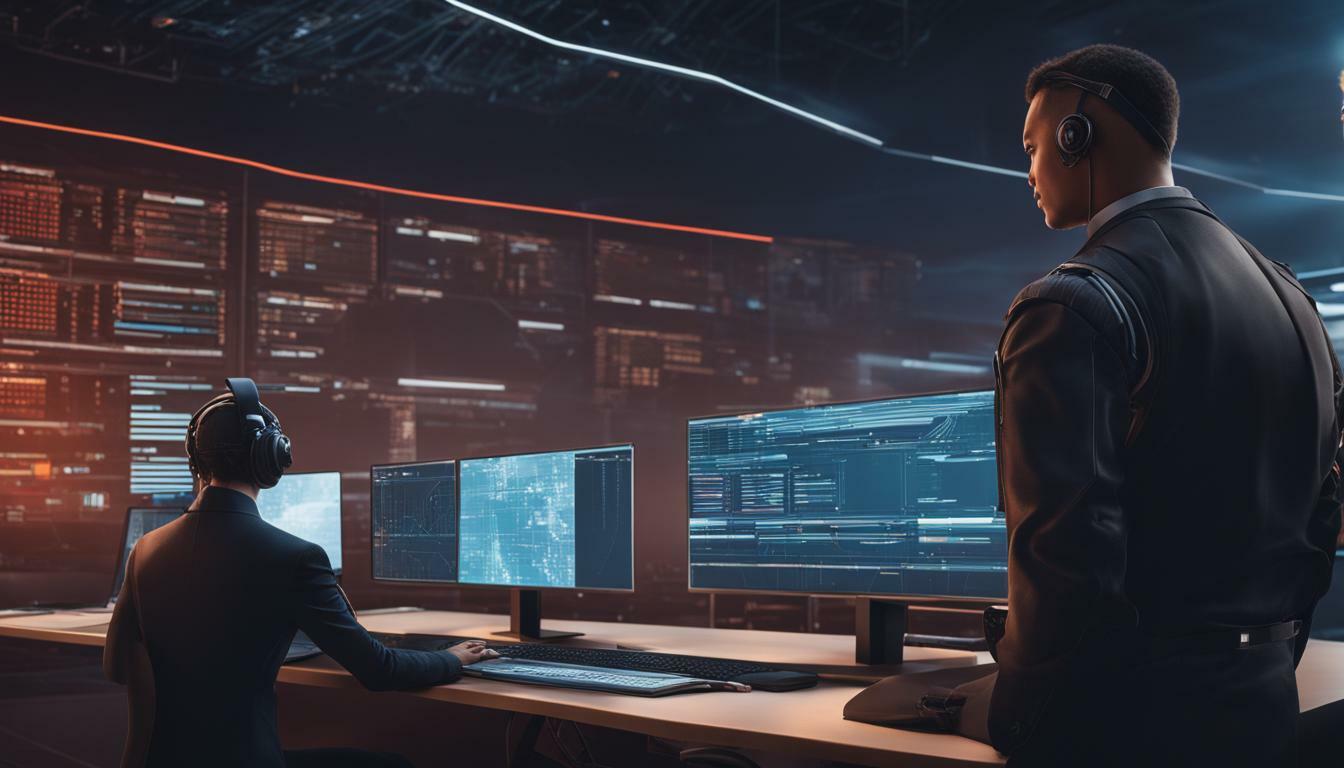Factual data: AI is increasingly being used in the field of cybersecurity to enhance threat detection, automate routine tasks, and improve data analysis and prediction. While AI-powered tools have proven to be effective in streamlining cybersecurity processes and improving efficiency, there are limitations to AI’s capabilities. AI lacks human intuition and decision-making skills, and its effectiveness is dependent on the quality and quantity of training data. Moreover, AI systems can be vulnerable to hacking and manipulation, raising concerns about security and privacy. Despite these limitations, human expertise will continue to play a crucial role in cybersecurity. Humans possess the ability to make strategic decisions, apply contextual understanding, and ensure ethical use of AI technology. Additionally, cybersecurity professionals will be needed to develop, manage, and maintain AI-powered tools and adapt their skills to the evolving field. The future of cybersecurity is likely to involve a harmonious convergence of AI and human intelligence rather than a complete replacement of human professionals by AI systems.
Key Takeaways:
- AI is increasingly being utilized in cybersecurity to enhance threat detection, automate tasks, and analyze data.
- Although AI has its limitations, such as lacking human intuition and decision-making skills, it can greatly improve cybersecurity processes.
- Human expertise remains crucial in cybersecurity due to the ability to make strategic decisions, apply contextual understanding, and ensure ethical use of AI.
- Cybersecurity professionals will continue to play a vital role in developing, managing, and maintaining AI-powered tools.
- The future of cybersecurity is expected to involve a harmonious convergence of AI and human intelligence rather than a complete replacement of human professionals by AI systems.
The Growing Role of AI in Cyber Security
As the threat landscape continues to evolve, the role of artificial intelligence (AI) in the field of cyber security has become increasingly prominent. AI-powered tools and technologies are being utilized to enhance threat detection, automate routine tasks, and improve data analysis and prediction in order to better protect individuals and organizations from cyber attacks.
One of the key benefits of AI in cyber security is its ability to detect and respond to threats in real-time. AI algorithms can analyze massive amounts of data, identify patterns, and recognize anomalies that may indicate a potential security breach. This enables organizations to proactively address security vulnerabilities and mitigate risks before they can cause significant damage.
In addition to threat detection, AI technology is also being used to automate routine tasks, such as patch management and network monitoring. By automating these processes, organizations can free up valuable human resources and allocate them to more strategic and complex tasks that require human expertise. This not only improves operational efficiency but also reduces the potential for human error, which can often be a weak link in cybersecurity defenses.
However, it is important to note that while AI has proven to be a valuable tool in cyber security, it does have its limitations. AI lacks the human intuition and decision-making skills that are crucial in identifying and responding to novel and sophisticated cyber threats. Furthermore, the effectiveness of AI systems is highly dependent on the quality and quantity of training data available. Without sufficient and diverse data, AI algorithms may produce inaccurate results or be susceptible to bias.
In conclusion, AI technology is playing an increasingly integral role in the field of cyber security. It offers numerous benefits, including improved threat detection, automation of routine tasks, and enhanced data analysis. However, it is important to recognize and address the limitations of AI, and to understand that human expertise will continue to be indispensable in the fight against cyber threats. The future of cyber security lies in a harmonious convergence of AI and human intelligence, where AI technology complements and augments the skills and capabilities of human professionals.
Limitations of AI in Cyber Security
Artificial Intelligence (AI) has emerged as a powerful tool in the field of cyber security, helping organizations detect and respond to threats more efficiently. However, it is important to acknowledge the limitations of AI and understand its role in the larger context of cyber security.
One of the primary limitations of AI in cyber security is the lack of human intuition and decision-making skills. While AI algorithms can analyze vast amounts of data and identify patterns, they may struggle to make sense of complex situations that require human judgment and context. This limits their ability to handle new and evolving threats that may not fit into pre-defined patterns.
Another concern is the quality and quantity of training data used to train AI models. AI systems heavily rely on data to learn and make accurate predictions or decisions. If the training data is biased, incomplete, or outdated, it can lead to inaccurate results and potentially harmful actions. Therefore, ensuring the availability of diverse and high-quality training data is essential for the effectiveness of AI in cyber security.
Furthermore, the vulnerability of AI systems to hacking and manipulation poses a significant challenge. Adversaries can exploit vulnerabilities in AI algorithms or manipulate training data to mislead or bypass AI-powered security measures. This raises concerns about the security and privacy of sensitive information, highlighting the need for robust security measures to protect AI systems.
Table: Limitations of AI in Cyber Security
| Limitation | Explanation |
|---|---|
| Lack of Human Intuition | AI lacks the ability to make intuitive decisions and apply context in complex situations. |
| Dependence on Training Data | The quality and quantity of training data can significantly impact the accuracy and effectiveness of AI in cyber security. |
| Vulnerability to Hacking | AI systems can be compromised, manipulated, or misled by adversaries, posing security and privacy risks. |
Despite these limitations, it is important to recognize that AI is not intended to replace human expertise in cyber security. Rather, it should be seen as a complementary tool that can enhance and assist human professionals in their work. Human cybersecurity professionals possess the strategic decision-making abilities, contextual understanding, and ethical judgment that AI currently lacks. They have the capability to adapt to new threats, develop and manage AI-powered tools, and ensure the responsible and ethical use of AI technology in cyber security.
The future of cyber security lies in the harmonious convergence of AI and human intelligence. By leveraging the strengths of both AI and human expertise, organizations can create a more robust and effective defense against cyber threats. This involves collaboration between AI technologies and human professionals, where AI can automate routine tasks, assist in data analysis, and enhance threat detection, while humans provide the critical thinking, adaptability, and ethical oversight necessary to protect against emerging and sophisticated cyber attacks.
The Importance of Human Expertise in Cyber Security
As the field of cyber security continues to evolve in the era of artificial intelligence (AI), the importance of human expertise cannot be overstated. While AI-powered tools have made significant advancements in threat detection, automation, and data analysis, they have inherent limitations that require the involvement of human professionals.
One of the main limitations of AI in cyber security is its lack of human intuition and decision-making skills. While AI algorithms can process vast amounts of data and identify patterns, they often struggle to understand complex contextual information and make strategic decisions based on nuanced factors.
Furthermore, the effectiveness of AI in cyber security is highly dependent on the quality and quantity of training data. Bias or incomplete data can lead to skewed outcomes and false positives or negatives. Human experts, on the other hand, possess the ability to apply contextual understanding and critical thinking to detect subtle anomalies and make informed judgments.
| Benefits of Human Expertise in Cyber Security |
|---|
| Strategic decision-making based on contextual understanding |
| Critical thinking skills to detect subtle anomalies and patterns |
| Ethical considerations in the use of AI technology |
Moreover, the security and privacy concerns surrounding AI-powered systems necessitate human oversight. AI systems can be vulnerable to hacking and manipulation, and trained adversaries can exploit their weaknesses. Cybersecurity professionals play a crucial role in developing, managing, and maintaining AI-powered tools, ensuring their security and mitigating the risks associated with their use.
In conclusion, while AI has undoubtedly enhanced cyber security by streamlining processes and improving efficiency, human expertise remains essential. The future of cyber security lies in a harmonious convergence of AI and human intelligence, combining the strengths of both to effectively combat evolving cyber threats.
The Harmonious Convergence of AI and Human Intelligence in Cyber Security
As the field of cyber security continues to evolve, the role of artificial intelligence (AI) is becoming increasingly prominent. AI is being leveraged to enhance threat detection, automate routine tasks, and improve data analysis and prediction. While AI-powered tools have proven to be effective in streamlining cyber security processes and improving efficiency, it is important to recognize their limitations.
AI is not capable of replicating human intuition and decision-making skills. Its effectiveness is highly dependent on the quality and quantity of training data available. Additionally, AI systems can be vulnerable to hacking and manipulation, raising concerns about security and privacy. These limitations highlight the continued importance of human expertise in the field of cyber security.
Human professionals possess the ability to make strategic decisions, apply contextual understanding, and ensure ethical use of AI technology. They play a crucial role in developing, managing, and maintaining AI-powered tools. Furthermore, cyber security professionals must adapt their skills to the evolving field, continuously upskilling to stay relevant in the AI era.
The Future of Cyber Security: A Collaborative Approach
The future of cyber security is likely to involve a harmonious convergence of AI and human intelligence. Rather than completely replacing human professionals, AI will complement and assist their work. This collaborative approach will harness the strengths of both AI technology and human expertise.
In this collaborative environment, AI can assist cyber security professionals in their tasks, improving efficiency and effectiveness. Human professionals will provide the necessary oversight, ensuring the responsible and ethical use of AI-powered tools. This partnership between AI and human intelligence will enable organizations to tackle the ever-evolving landscape of cyber threats in a more comprehensive and effective manner.
| Benefits of AI in Cyber Security | Importance of Human Expertise |
|---|---|
|
|
In conclusion, AI is revolutionizing the field of cyber security, but it is not a standalone solution. It is essential to recognize and leverage the strengths of both AI and human intelligence. The future of cyber security lies in a collaborative approach, where AI-powered tools support and enhance the work of human professionals. By embracing this harmonious convergence, organizations can establish a more robust and effective defense against cyber threats.
Leveraging AI to Enhance Cyber Security
Artificial Intelligence (AI) is revolutionizing the field of cybersecurity by offering advanced capabilities to combat the ever-evolving threats in the digital landscape. With its ability to process large amounts of data and detect patterns, AI-powered tools are enhancing threat detection, automating routine tasks, and improving data analysis and prediction, thereby bolstering cybersecurity defenses.
One of the key benefits of AI in cybersecurity is its ability to streamline processes and improve efficiency. AI-powered systems can rapidly analyze vast amounts of data, enabling cybersecurity professionals to focus on critical tasks. Automation of routine tasks also helps in reducing human error and response time, ensuring a more effective and proactive approach to cybersecurity.
However, it’s important to recognize the limitations of AI in the context of cybersecurity. While AI can analyze data and identify patterns, it lacks human intuition and decision-making skills. The effectiveness of AI systems heavily relies on the quality and quantity of training data available. Additionally, AI systems are susceptible to hacking and manipulation, raising concerns about security and privacy.
The Future of AI in Cybersecurity
Despite these limitations, AI is not set to replace human expertise in cybersecurity; rather, it will complement it. Human professionals possess the ability to make strategic decisions, apply contextual understanding, and ensure the ethical use of AI technology. Collaboration between AI and human experts is crucial to harness the full potential of AI in cybersecurity.
Cybersecurity professionals will continue to play a pivotal role in developing, managing, and maintaining AI-powered tools. They will need to adapt their skills to the evolving field of AI, leveraging its capabilities while addressing the challenges it presents. Upskilling and continuous learning will be key in staying ahead of cyber threats and making the most of AI-driven advancements.
The future of cybersecurity lies in a harmonious convergence of AI and human intelligence. AI-powered tools will assist cybersecurity professionals in identifying, analyzing, and mitigating risks, while human experts will provide the expertise, intuition, and ethical oversight necessary to protect sensitive information and ensure a secure digital environment.
Addressing Ethical Considerations in AI-Powered Cyber Security
The increased use of artificial intelligence (AI) in the field of cybersecurity has raised important ethical considerations. While AI-powered tools have proven to be effective in enhancing threat detection and analysis, there are concerns regarding privacy and security. The collection and utilization of vast amounts of data for training AI algorithms can potentially compromise user privacy. Additionally, there is the risk of AI systems being targeted by hackers and malicious actors, exploiting vulnerabilities in the technology.
Furthermore, the potential for algorithm bias in AI-powered cybersecurity tools poses a significant ethical concern. If the training data used to build AI models is biased or flawed, it can lead to discriminatory outcomes in threat detection and decision-making. This bias can disproportionately impact certain groups and contribute to inequitable treatment in cybersecurity.
It is therefore crucial to address these ethical considerations in AI-powered cybersecurity. Safeguards must be put in place to protect user privacy and ensure the security of AI systems. Transparency and accountability in the design and implementation of AI algorithms are essential to mitigate the risks associated with algorithm bias.
| Ethical Considerations in AI-Powered Cyber Security |
|---|
| The risk of compromising user privacy due to the collection and use of vast amounts of data. |
| The potential for AI systems to be hacked or manipulated by malicious actors. |
| The ethical concern of algorithm bias leading to discriminatory outcomes in threat detection and decision-making. |
| The importance of transparency and accountability in the design and implementation of AI algorithms. |
Collaboration between cybersecurity experts, data scientists, and ethicists is vital in addressing these ethical considerations. By working together, they can ensure that AI-powered cybersecurity tools are developed and deployed responsibly, placing user privacy and ethical use at the forefront. The development of guidelines and regulations specific to AI in cybersecurity can further promote ethical practices and protect against potential abuses.
As AI continues to evolve and play a more significant role in cybersecurity, it is essential to remain vigilant and proactive in addressing the ethical concerns associated with its use. By striking a balance between the benefits of AI and the protection of user privacy, security, and fairness, we can harness the potential of AI while upholding ethical standards in the field of cybersecurity.
The Need for Human Oversight in AI-Powered Cyber Security
As the field of cybersecurity increasingly embraces artificial intelligence (AI) technologies, it is important to recognize the need for human oversight and control to ensure the integrity and effectiveness of these AI-powered systems. While AI has proven to be a valuable tool in enhancing threat detection, automating routine tasks, and analyzing vast amounts of data, it is not without limitations.
One of the key limitations of AI in cybersecurity is its lack of human intuition and decision-making skills. While AI algorithms can be trained to recognize patterns and anomalies, they do not possess the contextual understanding and critical thinking capabilities of human professionals. This is particularly important in complex cybersecurity scenarios where strategic decision-making is required.
Furthermore, the effectiveness of AI systems is highly dependent on the quality and quantity of training data. Bias in the data used to train AI algorithms can result in skewed results and compromised security. Additionally, AI systems can be vulnerable to hacking and manipulation, leading to potential security breaches and privacy concerns. Human oversight is essential to ensure that AI-powered systems are properly trained, regularly updated, and secured against potential attacks.
Table: Comparison of AI and Human Expertise in Cyber Security
| AI | Human Expertise |
|---|---|
| Can process large volumes of data quickly | Can apply contextual understanding to identify complex threats |
| Can automate routine tasks | Can make strategic decisions and adapt to evolving threats |
| Lacks human intuition and decision-making skills | Can apply critical thinking and ethical judgment |
| Potential vulnerability to hacking and manipulation | Can provide human oversight and ensure cybersecurity measures |
In light of these limitations, it is clear that human expertise will continue to play a crucial role in cybersecurity. Humans possess the ability to make judgment calls, apply contextual understanding, and ensure ethical use of AI technology. Cybersecurity professionals will be needed to develop, manage, and maintain AI-powered tools, as well as adapt their skills to the evolving field. The future of cybersecurity is likely to involve a harmonious convergence of AI and human intelligence, leveraging the strengths of both to effectively combat emerging threats.
Adaptation of Cybersecurity Professionals in the AI Era
In today’s rapidly evolving landscape of cyber threats, cybersecurity professionals must adapt their skills to harness the potential of artificial intelligence (AI). Upskilling in AI is essential for these professionals to stay ahead of cybercriminals and effectively protect critical systems and information.
One of the key areas where cybersecurity professionals can benefit from upskilling in AI is threat detection. AI-powered tools can analyze vast amounts of data in real-time, enabling faster and more accurate identification of potential threats. By understanding how to utilize these tools and interpret their outputs, cybersecurity professionals can enhance their ability to identify and respond to emerging threats effectively.
Additionally, upskilling in AI allows cybersecurity professionals to leverage automation for routine tasks, freeing up valuable time and resources. Tasks such as system monitoring, data analysis, and vulnerability assessments can be automated using AI, enabling cybersecurity professionals to focus on more complex and strategic activities that require human expertise.
| Benefits of Upskilling in AI for Cybersecurity Professionals |
|---|
| Enhanced threat detection |
| Increased efficiency through automation |
| Improved data analysis and prediction capabilities |
| Ability to adapt to the evolving field of cybersecurity |
However, it is important to note that while AI can enhance cybersecurity, it cannot replace the human element. Human expertise is crucial for strategic decision-making, context understanding, and ethical considerations. Cybersecurity professionals provide the necessary critical thinking and judgment that AI systems currently lack. They play a vital role in ensuring the ethical and responsible use of AI technology in cybersecurity.
In conclusion, the adaptation of cybersecurity professionals to the AI era is essential for staying ahead of cyber threats. Upskilling in AI enables these professionals to take advantage of the benefits offered by AI technologies such as enhanced threat detection, increased efficiency, and improved data analysis. However, human expertise will continue to be indispensable in cybersecurity, providing the necessary context, judgment, and ethical considerations. The future of cybersecurity lies in a harmonious convergence of AI and human intelligence, where professionals leverage the power of AI while applying their expertise to protect against evolving threats.
AI as a Complementary Tool in Cyber Security
AI has become an indispensable tool in the field of cybersecurity, offering a range of capabilities that enhance threat detection, automate routine tasks, and improve data analysis and prediction. As cyber threats become more sophisticated and prevalent, AI-powered tools play a crucial role in streamlining cybersecurity processes and improving efficiency.
One of the key advantages of AI in cybersecurity is its ability to detect and respond to threats in real time. By analyzing vast amounts of data and patterns, AI systems can quickly identify anomalies and potential security breaches, allowing cybersecurity professionals to take immediate action. This rapid threat detection can significantly minimize the impact of cyber attacks and protect sensitive data from being compromised.
| Benefits of AI in Cyber Security |
|---|
| Enhanced threat detection |
| Automation of routine tasks |
| Improved data analysis and prediction |
However, it is important to acknowledge the limitations of AI in cybersecurity. While AI systems can process and analyze vast amounts of data, they lack human intuition and decision-making skills. Human cybersecurity professionals possess the ability to evaluate complex situations, apply contextual understanding, and make strategic decisions that go beyond the capabilities of AI systems. Moreover, the effectiveness of AI is highly dependent on the quantity and quality of training data available. Insufficient or biased data can lead to inaccurate predictions and compromised security.
Despite these limitations, the future of cybersecurity lies in a harmonious convergence of AI and human intelligence. While AI-powered tools play a significant role in improving efficiency and threat detection, human expertise and oversight are essential for ensuring the ethical use of AI technology and addressing the limitations of AI. Cybersecurity professionals are needed to develop, manage, and maintain AI-powered tools, adapt their skills to the evolving field, and provide the human intelligence that complements the capabilities of AI.
The Future of Cyber Security with AI
The integration of artificial intelligence (AI) in cyber security has reshaped the landscape of threat detection, data analysis, and automation. As technology continues to advance, the future of cyber security is likely to be driven by AI-powered solutions. AI has already proven its effectiveness in streamlining processes and improving efficiency in the field, but it’s important to consider the limitations of this technology.
While AI can process large amounts of data and identify potential threats at a faster rate than humans, it lacks human intuition and decision-making skills. AI systems are only as effective as the quality and quantity of their training data, which can be a challenge in an ever-evolving cybersecurity landscape. Additionally, there are concerns about the security and privacy of AI systems, as they can be vulnerable to hacking and manipulation.
Despite these limitations, human expertise will remain vital in the field of cyber security. Humans possess the ability to make strategic decisions, apply contextual understanding, and ensure the ethical use of AI technology. Cybersecurity professionals will play a critical role in developing, managing, and maintaining AI-powered tools, as well as adapting their skills to the evolving field.
The future of cyber security lies in a harmonious convergence of AI and human intelligence. Rather than replacing human professionals, AI will complement their expertise and enhance their capabilities. This partnership will enable more effective threat detection, faster response times, and improved strategies for combating cyber threats. By leveraging the strengths of both AI and human intelligence, the future of cyber security promises a more secure digital environment.
The Role of Collaboration Between AI and Human Experts
Collaboration between AI and human experts will be crucial in achieving the full potential of AI-powered cyber security. While AI systems can automate routine tasks and analyze vast amounts of data, human professionals can provide valuable insights, interpret complex situations, and make critical decisions. Together, they can create a more robust and effective cyber security framework.
| AI | Human Experts |
|---|---|
| Automates routine tasks | Provides contextual understanding |
| Detects and analyzes threats | Makes strategic decisions |
| Improves data analysis and prediction | Ensures ethical use of AI technology |
By combining the strengths of AI and human intelligence, organizations can establish a comprehensive cyber security framework that addresses the evolving nature of cyber threats. This collaboration will empower cyber security professionals to stay ahead of sophisticated attacks and protect sensitive data, ultimately ensuring a safer digital future.
The Importance of Collaboration Between AI and Human Experts
In the rapidly evolving field of cybersecurity, the role of artificial intelligence (AI) is becoming increasingly prominent. AI is being leveraged to enhance threat detection, automate routine tasks, and improve data analysis and prediction. While AI-powered tools have proven to be effective in streamlining cybersecurity processes and improving efficiency, it is important to recognize and address the limitations of AI in this domain.
One key limitation of AI in cybersecurity is its lack of human intuition and decision-making skills. While AI systems can analyze massive amounts of data and identify patterns, they struggle with understanding context and making strategic decisions based on complex factors. This is where human expertise becomes essential. Cybersecurity professionals possess the ability to apply contextual understanding, make critical decisions, and navigate complex ethical considerations.
Furthermore, cybersecurity experts play a crucial role in ensuring the security and privacy of AI systems. As AI becomes more integrated into cybersecurity operations, it is important to manage vulnerabilities and prevent AI systems from being exploited or manipulated by cybercriminals. Human oversight is necessary to develop, manage, and maintain AI-powered tools, as well as to address algorithm bias and eliminate false positives or negatives.
The AI-Human Partnership in Cyber Security
Instead of viewing AI as a complete replacement for human professionals in cybersecurity, the future is likely to involve a harmonious convergence of AI and human intelligence. The collaboration between AI and human experts can lead to more effective cybersecurity solutions. AI can assist cybersecurity professionals by analyzing large volumes of data, identifying patterns and anomalies, and streamlining routine tasks. Meanwhile, human experts can provide the contextual knowledge, critical thinking, and decision-making skills needed to interpret the results provided by AI systems.
To ensure the success of this collaboration, cybersecurity professionals need to adapt their skills to the evolving field of AI. Upskilling in AI technologies and continuous learning will be crucial for staying ahead of emerging threats and leveraging AI to its full potential. By embracing AI as a complementary tool rather than a complete replacement, cybersecurity professionals can enhance their capabilities and achieve better cybersecurity outcomes.
| A summary of the key points: |
|---|
| AI in cybersecurity enhances threat detection, automates tasks, and improves data analysis. |
| AI has limitations in human intuition, decision-making, and vulnerability to hacking. |
| Cybersecurity professionals possess contextual understanding and make critical decisions. |
| The collaboration between AI and human experts forms a harmonious partnership. |
| Cybersecurity professionals need to adapt their skills to AI and embrace it as a complementary tool. |
Section 13: Overcoming Challenges in AI in Cyber Security
The integration of artificial intelligence (AI) in the field of cybersecurity has presented numerous opportunities to enhance threat detection and improve overall security measures. However, it is important to acknowledge and address the challenges that arise with AI-based cyber security solutions.
One of the primary challenges is the quality and quantity of training data available for AI systems. AI relies heavily on data to make accurate predictions and decisions. Insufficient or biased training data can lead to inaccurate results and compromised security measures. Ensuring a diverse and representative dataset is essential to mitigate this challenge.
Another significant challenge is the vulnerability of AI systems to hacking and manipulation. As AI becomes more sophisticated, so do the techniques used by cyber attackers to exploit vulnerabilities. It is crucial to implement robust security measures to protect AI systems from unauthorized access and manipulation. Regular security audits and updates are necessary to stay ahead of potential threats.
Additionally, the lack of human intuition and decision-making skills in AI poses challenges in complex cybersecurity scenarios. Some threats require the ability to interpret contextual information, assess risks, and make strategic decisions. Human expertise is essential in such cases, as humans possess the ability to apply contextual understanding and adapt to evolving cyber threats.
| Challenges in AI in Cyber Security |
|---|
| Quality and quantity of training data |
| Vulnerability of AI systems to hacking and manipulation |
| Lack of human intuition and decision-making skills in AI |
Overcoming these challenges requires a collaborative approach that combines the strengths of both AI and human experts. While AI can streamline processes and automate routine tasks, humans can provide the necessary intuition, adaptability, and strategic thinking capabilities. Encouraging interdisciplinary collaboration between AI specialists and cybersecurity professionals is crucial to successfully harness the power of AI while mitigating its limitations in the field of cyber security.
Ensuring a Secure AI-Powered Cyber Security Environment
In the rapidly evolving landscape of cybersecurity, artificial intelligence (AI) has emerged as a powerful tool to enhance threat detection and response. AI-powered systems offer the potential to automate routine tasks, analyze vast amounts of data, and predict emerging threats more accurately. However, as organizations increasingly rely on AI in their cybersecurity strategies, ensuring a secure AI-powered environment becomes paramount.
One essential aspect of securing AI in cybersecurity is safeguarding the underlying data that powers these systems. High-quality and diverse training data are essential for training AI algorithms effectively. Organizations must take measures to ensure the integrity, confidentiality, and availability of the data, protecting it from unauthorized access, manipulation, or theft. Implementing robust data security measures, such as encryption and access controls, can help mitigate risks associated with AI-powered cybersecurity systems.
Another critical consideration is the security of the AI algorithms themselves. Just like any software, AI systems can be vulnerable to exploitation and manipulation. Hackers and malicious actors may attempt to tamper with AI models, introducing biases or manipulating the system to evade detection. Implementing rigorous testing, validation, and monitoring procedures can help identify and address potential vulnerabilities in AI-powered cybersecurity systems.
In addition to securing the technology, organizations must also address ethical considerations associated with AI in cybersecurity. The use of AI raises concerns about privacy, transparency, and accountability. Organizations must adopt responsible AI practices and ensure compliance with regulatory frameworks to protect the privacy of individuals and maintain transparency in algorithmic decision-making. Data anonymization, privacy impact assessments, and ethical guidelines for AI development and deployment can help mitigate these concerns.
| Key Considerations for Securing AI in Cybersecurity |
|---|
| Protecting the integrity, confidentiality, and availability of training data |
| Implementing robust data security measures, such as encryption and access controls |
| Ensuring the security of AI algorithms through thorough testing and validation |
| Addressing ethical considerations such as privacy, transparency, and accountability |
As AI continues to play an increasingly significant role in cybersecurity, organizations must prioritize the security of their AI-powered systems. By implementing robust data security measures, securing AI algorithms, and addressing ethical considerations, organizations can create a secure AI-powered cybersecurity environment that effectively combats emerging threats while protecting privacy and maintaining transparency.
Conclusion on AI in Cyber Security
In conclusion, the integration of artificial intelligence (AI) in the field of cybersecurity has brought about significant advancements and improvements. AI-powered tools have proven to be effective in enhancing threat detection, automating routine tasks, and improving data analysis and prediction. These technologies have the potential to streamline cybersecurity processes and improve efficiency in combating cyber threats.
However, it is important to recognize the limitations of AI in cybersecurity. While AI can process vast amounts of data at high speed, it lacks human intuition and decision-making skills. The effectiveness of AI systems is also dependent on the quality and quantity of training data available. Furthermore, AI can be vulnerable to hacking and manipulation, raising concerns about security and privacy.
Despite these limitations, human expertise remains indispensable in the field of cybersecurity. Humans possess the ability to make strategic decisions, apply contextual understanding, and ensure the ethical use of AI technology. Cybersecurity professionals play a crucial role in developing, managing, and maintaining AI-powered tools. They also need to continuously adapt their skills to the evolving field of AI in cyber security.
The future of cybersecurity lies in a harmonious convergence of AI and human intelligence. Rather than replacing human professionals, AI systems will work alongside them as complementary tools. This collaborative approach will combine the strengths of AI in processing and analyzing data with the unique capabilities of human experts in making critical decisions and interpreting complex contexts.
Summary of AI and Cyber Security
To summarize, AI has the potential to revolutionize the field of cybersecurity, enhancing threat detection, automating tasks, and improving data analysis. However, it is crucial to recognize the limitations of AI and the importance of human expertise in ensuring effective cybersecurity. The integration of AI and human intelligence will be key in addressing the evolving cyber threats of the future, creating a secure environment while also maximizing the benefits offered by AI technology.
FAQ
Will AI replace cyber security?
No, AI is not expected to replace cyber security but rather enhance it. While AI-powered tools have proven to be effective in streamlining cybersecurity processes, human expertise will continue to play a crucial role in making strategic decisions and ensuring ethical use of AI technology.
What is the growing role of AI in cyber security?
AI is increasingly being used in the field of cyber security to enhance threat detection, automate routine tasks, and improve data analysis and prediction. It has the potential to improve efficiency and effectiveness in combating cyber threats.
What are the limitations of AI in cyber security?
AI lacks human intuition and decision-making skills. Its effectiveness is also dependent on the quality and quantity of training data. AI systems can also be vulnerable to hacking and manipulation, raising concerns about security and privacy.
Why is human expertise important in cyber security?
Human expertise is crucial in cyber security as humans possess the ability to make strategic decisions, apply contextual understanding, and ensure ethical use of AI technology. They play a vital role in developing, managing, and maintaining AI-powered tools.
How will AI and human intelligence converge in cyber security?
The future of cyber security is likely to involve a harmonious convergence of AI and human intelligence rather than a complete replacement of human professionals by AI systems. AI will serve as a complementary tool, assisting human experts in their tasks.
How can AI be leveraged to enhance cyber security?
AI can be leveraged to enhance cyber security by improving efficiency, automating routine tasks, enhancing threat detection capabilities, and improving data analysis and prediction.
What are the ethical considerations in AI-powered cyber security?
Ethical considerations in AI-powered cyber security include concerns about privacy and the need to ensure ethical use of AI technology. These considerations highlight the importance of addressing potential risks and ensuring responsible AI implementation.
Why is human oversight important in AI-powered cyber security?
Human oversight is crucial in AI-powered cyber security as cybersecurity professionals play a vital role in developing, managing, and maintaining AI-powered tools. Their expertise ensures the effective and secure implementation of AI technology.
How should cybersecurity professionals adapt in the AI era?
Cybersecurity professionals need to adapt their skills to the evolving field of AI in cyber security. This may involve upskilling, continuous learning, and staying updated with advancements in AI technology.
What is the future of cyber security with AI?
The future of cyber security is expected to involve advancements and advancements in AI-driven technology. AI will continue to play a significant role, working in collaboration with human experts to enhance cyber security capabilities.
Why is collaboration between AI and human experts important in cyber security?
Collaboration between AI and human experts is important in cyber security as it combines the strengths of AI technology and human intuition. An AI-human partnership approach can lead to more effective and efficient cyber security strategies.
What are the challenges in AI in cyber security?
Challenges in AI in cyber security include issues such as data quality, scalability, and algorithm bias. Overcoming these challenges is crucial for the successful implementation and utilization of AI in cyber security.
How can a secure AI-powered cyber security environment be ensured?
Ensuring a secure AI-powered cyber security environment requires robust security measures to protect AI systems from hacking and manipulation. This may involve security protocols, encryption, and continuous monitoring.








